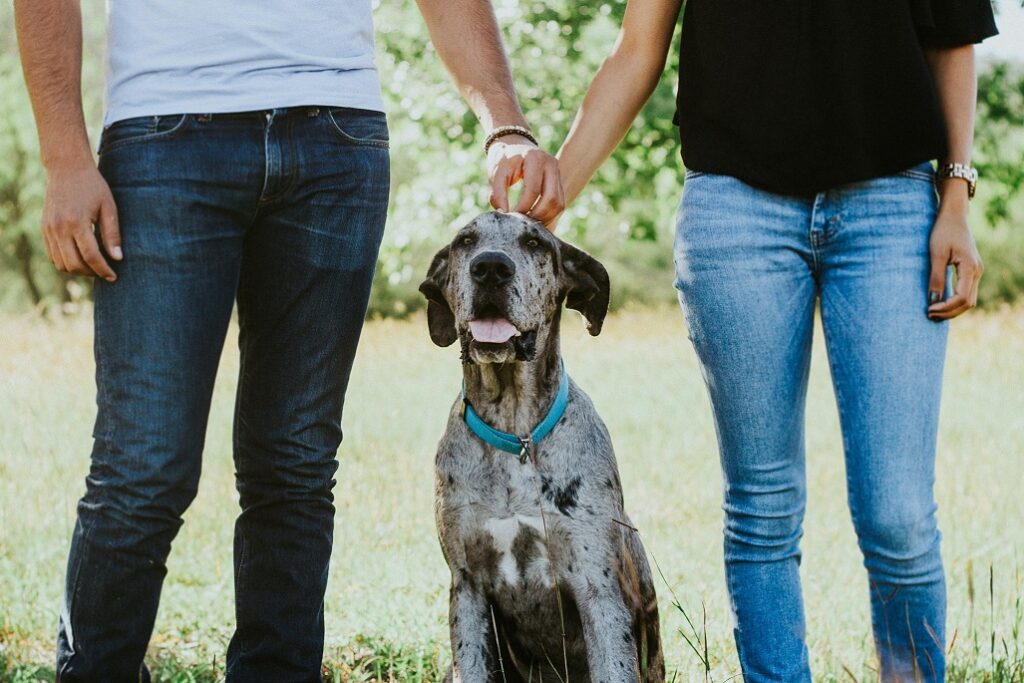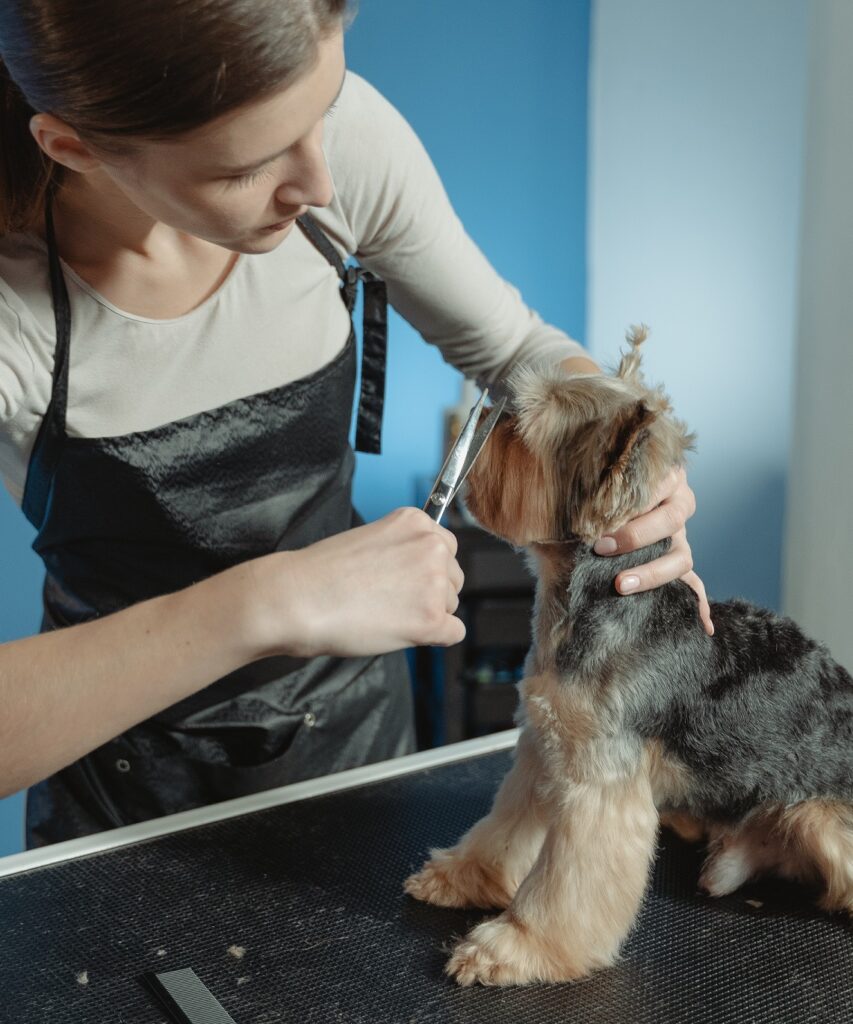By initiating and nurturing relationships with other pet professionals, you can help your dog training business grow. Partnerships bring your business to the attention of new clients, help you create supportive relationships with like-minded pet professionals, and provide you with fresh inspiration throughout your career.
 Let’s explore some ways to reach out to other businesses and get to work building connections that can bring you referrals, revenue, professional fellowship, and more.
Let’s explore some ways to reach out to other businesses and get to work building connections that can bring you referrals, revenue, professional fellowship, and more.
Why do other businesses refer clients to a trusted dog trainer?
Have you ever gotten a text from a friend or family member with a medical question about their dog, even though you’re not working in veterinary medicine? They hope – because you are savvy about dogs – you may have run across the answer they need. Pet guardians ask their groomer, dog-daycare provider, or specialty pet-food store manager for guidance about everything from the best dog food, to dog training, to that odd lump on their pup’s chin. A responsible pet business will usually refer their friends, family and valued customers to another pet expert they know and trust for help outside of their realm of knowledge. When it comes to questions about dog training, your goal is to become one of those experts.
How do you find these businesses for possible partnerships and referrals? Think of all the pet care needs that dog guardians have and what local businesses they visit to purchase these products and services.
-
- Animal shelters and dog rescues
- Veterinarians
- Groomers
- Dog boarding and daycare
- Local specialty pet stores.
- Large pet stores – although check their services. Some offer their own in-store training classes and may or may not refer clients to independent dog trainers.
Don’t stop with the obvious choices. Where else do people purchase pet products or go exploring with their dog?
-
- Farm stores
- Non-pet businesses that are super dog-friendly, like beer gardens, outdoor cafes, hardware stores, etc.
- Local non-profit animal associations, like incorporated dog parks
An easy way to start to get to know a local business is to visit their website and opt-in to their email list. You’ll learn more about their mission and services and will get a heads-up on special events where you could join in with a booth or demo class.
How does dog behavior impact pet businesses?
It’s not surprising that non-trainer pet businesses run into training and behavior issues with their canine clients and visitors. Here are just a few ways dog behavior impacts other pet businesses – and why they may refer their own clients to a dog trainer they trust and respect.
 Dog groomers thrive on repeat business and get to know their customers and their dogs really well. They take note if dogs have any unusual lumps or bumps, skin conditions, or obvious dental issues. They also notice when a dog arrives already anxious from the car ride, is frightened by being confined to a crate, or if they are continually uncomfortable around unfamiliar dogs and people. The groomer is likely to mention these health and behavior issues to their customer and may recommend a dog trainer or veterinarian for the dog’s wellbeing.
Dog groomers thrive on repeat business and get to know their customers and their dogs really well. They take note if dogs have any unusual lumps or bumps, skin conditions, or obvious dental issues. They also notice when a dog arrives already anxious from the car ride, is frightened by being confined to a crate, or if they are continually uncomfortable around unfamiliar dogs and people. The groomer is likely to mention these health and behavior issues to their customer and may recommend a dog trainer or veterinarian for the dog’s wellbeing.
Animal shelters have dogs of all ages and temperaments in their care, from frisky puppies and bouncing adolescents, to nervous adults and uncertain seniors. Shelter staff are often asked for guidance on basic dog behavior, puppy socialization and manners training by new adopters. They also field calls from pet guardians who are at their wit’s end and are thinking about surrendering their dog due to behavior issues. A referral to an experienced dog trainer can help sooth the way for both new and long-time canine family members.
Veterinarians and veterinary technicians have the privilege of one-on-one time with dog guardians during health visits. In that private space, dog owners share their concerns about both health and behavior issues. Veterinary staff also see a dog’s behavior firsthand. An energetic dog who is unfamiliar with basic cues can be difficult to weigh or examine. A dog who is uncertain in a strange-smelling, echoing lobby or treatment room may nervously growl, nip, or bite. In addition to offering medical options to help relieve anxiety, a veterinarian may refer their client to a dog trainer they know and trust.
Dog trainers also sometimes partner with other trainers to meet the needs of their community. Not every dog trainer chooses to hold puppy classes, agility or fitness training, or help with anxiety or aggression issues. Trainers can help one another by referring callers based on training niche and expertise.
How can a dog trainer connect with other busy pet businesses?
Getting to know local pet professionals is the first step in building valuable connections for future referrals. Here are some suggestions that provide winning results for businesses, dogs, and dog guardians, too.
 Offer lunch-and-learns for veterinary staff and other pet businesses. Every pet business loves a break from the usual workday, and a pizza-bearing dog trainer is usually welcomed with open arms. Give a call (as you have time) to local veterinary clinics, animal shelters, pet supply stores or farm stores, saying “Let me bring pizza and take just a half-hour of your time. I’d love to tell you about the services our training business provides.” It’s a fun and conversational way to meet both the front desk and behind-the-scenes staff at local pet businesses and can open the door to customer referrals and future partnership conversations.
Offer lunch-and-learns for veterinary staff and other pet businesses. Every pet business loves a break from the usual workday, and a pizza-bearing dog trainer is usually welcomed with open arms. Give a call (as you have time) to local veterinary clinics, animal shelters, pet supply stores or farm stores, saying “Let me bring pizza and take just a half-hour of your time. I’d love to tell you about the services our training business provides.” It’s a fun and conversational way to meet both the front desk and behind-the-scenes staff at local pet businesses and can open the door to customer referrals and future partnership conversations.
Hold short-n-sweet events at a pet supply store. A free demo of clicker training, an exhibition of loose-leash walking, or a demonstration of how to properly use equipment like front-attach harnesses, muzzles, etc. increases store revenue by getting customers in the door. It can also send you home with email addresses to build your contacts list, and a new client or two as well.
Share super-useful information. If you already share a “Getting Started” folder with your own clients, consider offering a a tip sheet or introductory training articles for your local veterinarians, groomers, or other pet professionals to share with their clients, too. Tailor your material with business-relevant content like “Preparing your dog for their veterinary visit” or “Helping your dog love their groomer.” Be sure your printed materials are branded with your business name, a short bio, and your contact info.
Promote other pet businesses. The best way to spark referrals is to give that gift yourself. Spotlight businesses you’ve come to know and respect in your email newsletter. Call out a “local pet business of the month” on your social media channels. Be sure to tag or notify them so they know you are spreading the word about their business.
Become the go-to dog training expert for your local news station. If you have a local television or radio station, would you be into offering them a weekly recorded “Dog-Training Minute?” They’ll benefit by offering valued content for their dog-loving listeners, and you’ll make important contacts in local media. Your business will also receive valuable on-air marketing recognition.
Don’t be a stranger. Strengthen and enjoy your existing relationships by dropping in now and then with both edible and educational goodies. Purchase pet and office supplies from local businesses instead of buying online, and introduce yourself to new staff when you check out. Comment on their social media posts and tag them on yours when relevant. And always have a stack of thank-you cards on hand so you’re ready to share your appreciation when a new client mentions they were referred to you. Let veterinarians, groomers, shelters, pet sitters and specialty store owners know they are an important part of your professional circle, and they’ll consider you part of theirs.
Meet like-minded professionals through events and friendly outreach
Networking with other professionals is one of the most enjoyable aspects of a pet-centric career. In addition to building your referral circle, networking can help banish some of the isolation that comes with being a solo or small business entrepreneur.
You can get to know current and emerging leaders in the industry by attending dog behavior and training conferences. Professionals who speak at conferences or exhibit at pet expos attend these events because they want to share their expertise, so don’t be shy about introducing yourself. Take advantage of both face-to-face and virtual opportunities to create new connections in person or with a follow-up email.
Stop in to welcome new pet businesses that open in your community. By initiating this friendly connection, you can help these businesses become collaborators rather than competition. Some business owners or staff may even become close friends over time – friends who don’t mind endlessly talking about dogs!
Business relationships open doors to shared projects
Over time, business partnerships can develop into far more than simple referrals. Veterinarians, pet supply stores, and other pet businesses are always on the lookout for ways to create a stronger bond with their clients. Animal shelters want to see adopted dogs and their guardians develop into great community citizens. An expert dog trainer is an excellent fit for those plans.
- An animal shelter or larger pet store that holds regular training classes at their own facility might hire your business to fill that need.
- You could receive an invitation to be a regular participant in an animal organization’s monthly staff training.
- A large veterinary clinic might want to create a formal relationship with an expert dog trainer, adding value to their existing client services by offering training and behavior consultations.
Formal partnerships are based on trust, respect, and expertise, as well as mutual benefit. Before shaking hands on an agreement with another organization, you’ll want to be sure you’re qualified to meet their needs and expectations and have business and professional liability insurance coverage that is specific to dog training.
Start by strengthening your expertise
Pet businesses refer their customers to other pet professionals they know they can trust. Certification with a respected dog trainer academy will help validate your expertise.
The Victoria Stilwell Academy’s VSA-Certified Dog Trainer (VSA-CDT) designation represents the successful completion of VSA’s rigorous and advanced study of dog training and animal behavior. This certification carries our well-known reputation as a leading dog training educational institution. Those who earn it are recognized for professionalism in the field of dog training, having been deemed by VSA to possess the skills, knowledge and experience to help both dogs and owners with their dog training and behavior needs.
What better way to ramp up your expertise and help earn the respect of pet professionals in your community and beyond? You can learn about all of our Dog Trainer Courses here.



